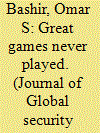| Srl | Item |
| 1 |
ID:
156240


|
|
|
|
|
| Summary/Abstract |
Why do energy-hungry states nevertheless choose not to compete over energy resources? Contrary to the initial expectations of scholars and analysts, major changes in global energy supply have sometimes failed to spark “great games.” This paper presents an explanation for variation in competition, arguing that shifts involving energy touch off competition only when they affect political power between rivals in specific ways, when they do not result in beneficial effects that outweigh concerns about power, and when the cost of competition is bearable. After clarifying the concept of power in the energy issue area, the article applies this explanation to US decisions during four major post-Cold War developments in oil or natural gas, illustrating why American decision-makers chose to engage in competition with Russia or China in only half of these instances. The article concludes with implications for US grand strategy.
|
|
|
|
|
|
|
|
|
|
|
|
|
|
|
|
| 2 |
ID:
119960


|
|
|
|
|
| Publication |
2013.
|
| Summary/Abstract |
In a well-publicized finding, Bueno de Mesquita and Smith argue that temporary members of the United Nations Security Council (UNSC) suffer politically and economically because they receive elevated inflows of foreign aid in exchange for votes. Closer examination of the data reveals a lack of support for this claim. Even when the analysis is limited to countries that do not enjoy temporarily increased aid during tenure, UNSC membership retains an association with poor outcomes that are disproportionately strong in nondemocratic countries, contrary to the expectation generated by selectorate theory. A separate least-likely test specification further weakens the case against foreign aid. The authors postulate and weigh alternative explanations. Temporary membership may enable deleterious state policy through a lessened fear of international sanction. Alternatively, the membership selection process may be biased in a way not currently recognized by scholars who employ UNSC election as a source of exogenous variation in the international system.
|
|
|
|
|
|
|
|
|
|
|
|
|
|
|
|